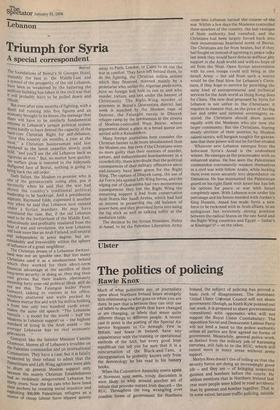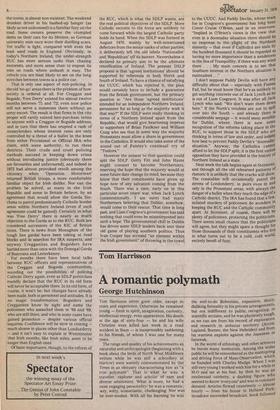The politics of policing
Rawle Knox
Much of what politicians say, or journalists opine about Northern Ireland bears strangely little relationship to what goes on when you are there. In part that is because they can only use old labels to describe goods that have changed or are changing, or labels that mean quite different things to different people. A recent case in point is the posting of the Special Air Service Regiment to Co Armagh. Few in Britain, and fewer in Ireland, have any acquaintance with the training or operational methods of the SAS, but every good Irish republican can tell you for sure that it is a reincarnation of the Black-and-Tans, a disorganisation he probably knows only from the demonology he has read in his history books.
When the Convention Assembly meets again at Stormont next week, windy discussion is soon likely to whip around another set of initials that provoke instant Irish discord — the RUC. Throughout the long wrangling over possible forms of government for Northern Ireland, the subject of policing has proved a basic rock of disagreement. The dominant United Ulster Unpnist Council will not share government (though, as Keith Kyle pointed out last week, it is prepared to share governmental committees) with opponents who will not support the Royal Ulster Constabulary. The opposition Social and Democratic Labour Party will not lend a hand to the police authority unless all parties are first agreed on forms of government. Meanwhile, general police work, as distinct from the military job of harassing terrorists, still falls to to the RUC, which still cannot move in many areas without army support.
Merlyn Rees doesn't tire of telling us that the security forces are doing an increasingly good job — and they are — of bringing suspected gunmen and bombers before the courts. He seldom mentions that in Northern Ireland last tyhe aanr mh yo rgenpnemo apnl e andwerenktni lheedr i tnn gr oe at hd ear c cTi hd ae tn is
'to some extent because traffic policing, outside the towns, is almost non-existent. The weekend drunken driver in his bashed-up banger (as likely as not unlicensed) is a familiar fury on the road. Some owners preserve the crumpled dents on their cars for its lifetime, as German university men once wore their duelling scars. Yet traffic is light, compared with even the least used roads in England. Obviously, in today's Northern Ireland, the under-strength RUC has more serious tasks than chasing motorists, and more sense than to expose its men on roads where ambush is easy. The vehicle you are least likely to see on the long stretches between towns is a police car.
That is only one aspect of non-policing. In the old `no-go' areas there is the problem of how society is ordered at all. For Creggan and Bogside, 'Free Derry' existed for almost twelve months between '71 and '72; even now police will not serve a summons there without an army escort. The result is that firms in the city proper will rarely extend hire-purchase terms to anyone with a Creggan or Bogside address, and in turn that there has erupted a rash of moneylenders whose interest rates are only controlled by a threat of a bulletin the knee from either Provisional or Official IRA who claim, with some authority, to run these districts. Their crude and cruel policing methods succeed in keeping down crime without introducing justice (obviously there are favourites and unfavoured), and indeed in 1972 had almost provoked revolt among the citizenry when 'Operation Motorman' returned British troops, a more comfortably familiar object for Irish dislike. Nor can the problem be solved, as many in the Irish Republic and some in Britain believe, by an agreement that would allow the Garda Siochana to patrol predominantly Catholic border areas within Northern Ireland (even if such agreement could be gained). Certainly in what was 'Free Derry' there is nearly as much objection to the Garda as to the RUC. Both are considered successors of the RIC of British times. There is news from Monaghan of the tough line gardai have been taking at road blocks and in searches for IRA suspects, and anyway Cregganites and Bogsiders have battled more than once with the Donegal Garda of Buncrana and Letterkenny.
For months there have been local talks between RUC officers and representatives of the Creggan and Bogside communities, sounding out the possibilities of policing Catholic Derry again, even as SDLP politicians roundly declare that the RUC in its old form will never be acceptable there. In its old form, of course, it won't be; but changes have already been made, both in personnel and attitudes. It is no magic transformation. Bogsiders and Cregganites know by sight and name the policemen who assaulted them in '68 and '69, who are still there, and who in some cases have gained promotion — despite various official inquiries. Confidence will be slow in coming — much slower in places other than Londonderry — and it isn't easy to explain in Westminster that Irish months, like Irish miles, seem to be longer than English ones: Of basic importance, though, to the reform of the RUC, which is what the SDLP wants, are the real political objectives of the SDLP. More Catholic recruits to the force are unlikely to come forward while the largest Catholic party holds its hand. When the SDLP was formed in August 1970, mainly by well-intentioned defectors from the senior ranks of other parties, it deliberately left the old labels 'Nationalist' and 'Republican' off its banner. Nevertheless it 'declared its primary aim to be the ultimate reunification of Ireland. The present DSLP proposal is that 'agreed institutions' should be supported by referenda in both North and South of Ireland. To have a chance of satisfying the UUUC, which has rejected it, the plan would certainly have to include a guarantee from the British government, but the primary question is: "Are those 'agreed institutions' intended for an independent Northern Ireland, permanent for as long as the majority wish it that way?" If the SDLP were really thinking in terms of a Northern Ireland apart from the Republic, that would give heartening impetus to supporters of Brian Faulkner and William Craig who see that in some way the majority Protestants must allow a share in government to the Catholics. It would also take some of the sound out of Paisley's continual cry of "Traitors," However the answer to that question could split the SDLP. Gerry Fitt and John Hume might consent to become Northerners, reserving the hope that the majority would at some future date change its mind, because they know that their constituents have given up hope now of any salvation coming from the South. There was a time, early on in this particular seven years' war, when Jack Lynch (unintentionally, I am sure) had many Northerners believing that Dublin, somehow, would come to their rescue. That time is long past, and Liam Cosgrave's government has said nothing that could even be misinterpreted into such a hope. The governmental chill in Dublin has driven some SDLP leaders back into their old game of playing southern politics. Thus Ivan Cooper has accused "an element within the Irish government" of throwing in the towel to the UUUC. And Paddy Devlin, whose main foe in Cosgrave's government has long been Conor Cruise O'Brien, said in an interview: "Implied in O'Brien's views is the view that even in a doomsday situation there should be no response to the plight of the Northern minority — that even if Catholics are slain by the hundred thousand it should be regarded as having no more importance than a sandstorm in the Sea of Tranquillity, if there was any wind there . . My main concern is to see that Southern interest in the Northern situation is maintained ..."
I don't suppose Paddy Devlin will have any difficulty about that — especially with Fianna Fail, but he must know that he's as unlikely to get anything concrete out of Jack Lynch as he is out of Liam Cosgrave. It was after all Jack Lynch who said: "We don't want them down here." If the North's troubles are not to spill over into the South — and already there is considerable seepage — it would seem sensible for Dublin, where there is now some recognition of the reforms taking place in the RUC, to support those in the SDLP who are thinking in terms of law and order, and indeed how best to prevent Paddy Devlin's "doomsdaY situation." Anyway, the Catholics cannot afford to let the SDLP split; it is the first united opposition they have provided in the history of Northern Ireland as a state.
Next week the talk begins again at Stormont, and through all the old rehearsed patterns of rhetoric it is unlikely that the cracks will show. . The constables will occasionally patrol the streets of Londonderry, in pairs even in and only in the Protestant areas, with always the danger of a bullet when they reach the edge of a Catholic district. The IRA has found that a feW, isoated murders of policemen do wonders in -keeping the RUC and the Cath9lic community apart. At Stormont, of course, there will be plenty of policemen, protecting the politicians. There seems small chance that the politicians will agree, but they might spare a thought for those thousands of their constituents who live in what turns out to be a cold, cold world, entirely bereft of fuzz.



























 Previous page
Previous page